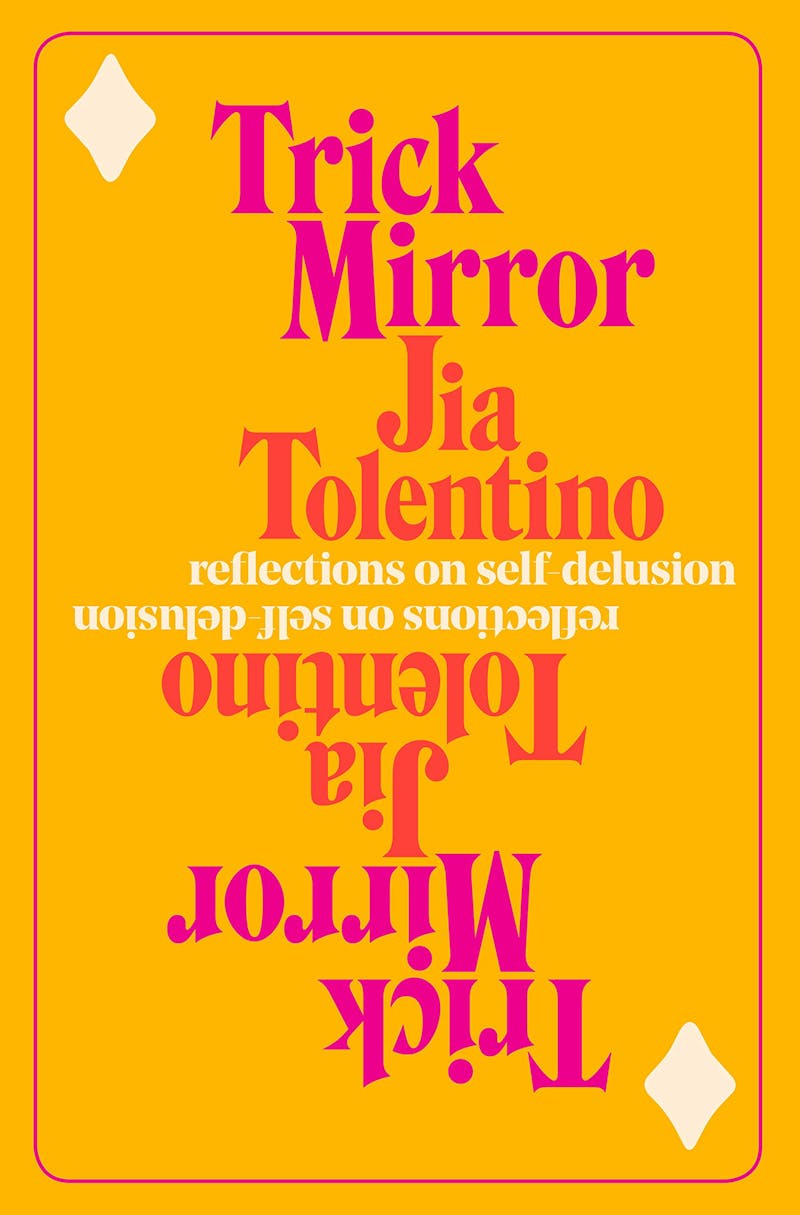“I’m going insane! I literally am addicted to the web!” wrote Jia Tolentino, aged ten, on an Angelfire site she created in 1999. Two years later, she was publishing several thousand words a week on LiveJournal; three years after that she migrated to MySpace. As she finished high school, she got Facebook and then, a couple of years out of college, Twitter, the better to circulate the essays and interviews she had started publishing. In 2013 she became an editor for the Hairpin, a women’s website belonging to the now-defunct Awl network, and the following year moved to the feminist blog Jezebel, then owned by Gawker Media. In the summer of 2016, a week after Gawker filed for bankruptcy, the New Yorker announced that it had recruited her as a staff writer.

Tolentino, who is 30, belongs to the microgeneration that remembers a time before the internet, but for whom the advent of the internet coincided with the advent of adolescence, so that the world-expanding experiences of the two became inextricable from one another. This positioning, right in the middle of the millennial generation, is part of what makes her one of the most persuasive commentators on the seductions and ironies of cultural and other forms of capital, and the ways they move through the digital sphere. Growing up sharing her feelings online was no doubt good training for the Hairpin and Jezebel, both websites that became successful in part through publishing extremely personal first-person essays. In a 2017 article in the New Yorker, Tolentino recalled receiving, in her first couple of years at those sites, “at least a hundred first-person pitches and pieces each week.”
A number of the nine essays in Trick Mirror, Tolentino’s first book, are more or less straightforwardly memoiristic. She looks back on the weeks she spent, aged 16, participating in a reality TV show in Puerto Rico called Girls v. Boys. She surveys the hardy, cheerful female protagonists of books that she loved as a child, and muses upon how disconnected she feels from the heroines of adult novels, both because of these heroines’ bitterness and constrained circumstances, and because of their whiteness (Tolentino is Asian American). She considers her experience growing up in a wealthy, white, Evangelical Christian community in Houston and, having lost her faith as a teenager, finding in recreational drugs the ecstasy that she once located in religion.
None of these essays could be described as ultra-confessional, and none of them dwells on the pain, trauma, or gross-out physical experiences in which Jezebel essays, for example, often specialized. Rather, the most autobiographical essays in Trick Mirror are those that most steadfastly reject distress, adopting instead a slightly distanced optimism. They give the impression of an author who believes that our most private and painful experiences are often not, in fact, the ones through which we learn the most. Writing about the unhappy white heroines of Anglo-American fiction, Tolentino says that she felt “shut out of a realm that I didn’t even really want to enter,” before concluding that not entering that realm has actually been beneficial, helping her to affirm her identity and become “something more” than their sorry examples of marital misery and trampled ambition. “I’ve always been glad that I grew up the way I did,” she writes elsewhere, referring to her Evangelical Christian adolescence. Her Texan megachurch “trained me to feel at ease in odd, insular, extreme environments, a skill I wouldn’t give up for anything, and Christianity … gave me a leftist worldview, an obsession with everyday morality, an understanding of having been born in a compromised situation, and a need to continually investigate my own ideas about what it means to be good.”
The tone of these essays can partly be attributed to Tolentino’s temperament. “I value control almost as a matter of etiquette—as an aesthetic,” she says at one point, and it’s true that her writing, lively and funny and poignant as it often is, resists big emotional crescendos. But her tone is also the product of the contemporary moment. The article in which she described being sent a hundred first-person pieces every week appeared under the decisive headline “The Personal-Essay Boom Is Over” and pointed out that, since Trump’s election, women’s websites have turned away from the confessional writing that that helped make their names. (Some of these sites no longer exist: The Hairpin and the Awl have both shuttered, and xoJane, with its notorious “It Happened To Me” section, ceased operations at the end of 2016. Jezebel, since Gawker’s closure, has continued under different ownership.)
Also shaping the sensibility of Trick Mirror is Tolentino’s position at the New Yorker. For the past three years, Tolentino has published a series of short articles, dense with links to memes and tweets, on the New Yorker website, explaining whatever it is that millennials are talking about that week or month: Talk of the Town, if you like, where the town is the internet and its center is the intersection of pop culture and social media. Recently, for example, she has puzzled over the trend for people on Twitter to implore celebrities to kill them, and riffed on the internet’s hysterical response to stories involving the phrase “my wife”. One of the pleasures of Trick Mirror is its tour of internet absurdities of the past few years. (Remember Nigel, the gannet whose long devotion to a concrete bird led him to be berated on Twitter for his male entitlement?)
Alongside contributing longer pieces about books and music, Tolentino has become one of the New Yorker’s chief reporters on the #MeToo movement and the never-ending series of accusations of sexual assault against Donald Trump. Two of her most substantial and most popular pieces report extensively on a brand—the e-cigarette Juul, the leisurewear company Outdoor Voices—and ask what their success tells us about capitalism, youth culture, contemporary feminism and misogyny, and the interaction of all those things.
Trick Mirror revisits, at greater length, a number of these topics (each essay is about 35 pages). “Always Be Optimizing” only mentions Outdoor Voices in passing, but it similarly argues that expensive exercise classes and workout clothes, along with salads that cost $12 and can be eaten in under ten minutes (hello, Sweetgreen) feel both normal and necessary in a culture that requires women to be maximally attractive and maximally efficient. “The Story of a Generation in Seven Scams” connects Fyre Fest, the Trump presidency, and the financial crash with other, subtler scams that have shaped Tolentino’s generation: Facebook, which pretends to offer us a product when, as we all now know, the product is us; corporate feminism—or, in Tolentino’s perfect formulation, the “spurious, embarrassing, and limitlessly seductive sales pitch that feminism means, first and foremost, the public demonstration of getting yours”; and soaring college tuition fees. Two of Trick Mirror’s most sober essays worry, respectively, about the effects of the normalization of sexual assault, and that a new awareness of the mistreatment of women, post-#MeToo, risks making a woman’s mistreatment the most important thing about her.
These four essays, as well as one in which Tolentino recounts her early internet use, are at once the best and the most conflicted of the collection. Their conflict stems not from painful personal experience, but from Tolentino’s sense of complicity in the systems she criticizes. It’s virtually impossible to use the internet without participating in its queasy attention economy, but for Tolentino the sense of self-compromise is particularly intense: Her job involves writing on and about the internet, and in the past few years her career has taken her from scrappy, oppositional websites that set themselves against both mainstream online culture and against the New York media establishment, to the magazine most associated with that establishment. “I have benefited … from the internet’s unhealthy focus on opinion … the way the internet generally minimizes the need for physical action,” she confesses. In speaking up for the oppressed, or on behalf of a political cause, “Solidarity … gets inextricably tangled up with visibility, identity, and self-promotion,” while condemning someone or something “just end[s] up promoting their work.”
“Always be Optimizing” recounts how, in the early 2010s, Tolentino’s repulsion to the softness and body-acceptance of yoga drove her to seek out the eroticized discipline of barre class. At barre, Tolentino often feels “like my body is a race car that I’m servicing dispassionately in the pit.” But barre also trains women’s minds, teaching them how to “function more efficiently within an exhausting system,” and to look good while doing so. Functioning with maximum efficiency, even if looking good while doing so, is no way to live, and Tolentino remains, as she tells us near the end of the essay, “extremely suspicious of our old friend barre.” She also remains a regular attendee at classes.
Another essay, “We Come from Old Virginia,” examines a different kind of complicity. In the wake of the discredited Rolling Stone story about a rape at the University of Virginia, Tolentino reevaluates her own undergraduate experience at UVA, reflecting on “what I’d been blind to, what I’d chosen to see and not to see”; her cheerful handing over of sorority dues semester after semester; her eye-rolling when classmates began comments with the words “As a feminist.” She remembers, too, spending a year in Kyrgyzstan with the Peace Corps, worn down by everyday sexual harassment and half-wishing—perhaps, she speculates, like the victim in the Rolling Stone story—that something more dramatically terrible would happen so that her suffering would be recognized and validated.
Some of the hand-wringing in Trick Mirror may go too far. Criticizing something can bring it to a larger audience, but the alternative—a world in which writers only cover subjects of which they approve, ignoring the complicated, the compromised, and the outright pernicious—is not preferable. Elsewhere, the hand-wringing seems to substitute for action that is not, in fact, beyond reach. In the book’s preface, Tolentino writes that her subjects are the “prisms through which I have come to know myself,” and her essays an attempt to “undo their acts of refraction.” Trick Mirror seems of two minds about this undoing. Here and elsewhere, Tolentino is rightly critical of the idea that individual rather than structural change can stop the way that capitalism, with the internet’s help, is learning to commodify “personality and relationships and attention.” At the same time, a number of Tolentino’s essays end with a paragraph or two suggesting what we might, individually, do, in the absence of legislative regulation. We might “care less about our identities”; we might, like Tolentino, once we’ve reached relative financial stability, stop using Amazon or restrict our time on Instagram.
But these are vague or small suggestions, and the paragraphs in which Tolentino offers them are rushed, pushed aside by a recurring problem: If understanding why we want what we want doesn’t stop us wanting it, what is to be done? The speed with which Tolentino wraps up her essays after grappling with her complicity suggests that this question is unanswerable. Perhaps this is true. But it’s also true that, if we know that what we want is bad for us, we are not always powerless to refuse it. When Tolentino describes herself as “extremely suspicious” of barre, she calls into being a shadow self, one whose suspicions shape her actions, even if they don’t change her wants. The most effective essays in Trick Mirror are those that encourage us to be suspicious, and to look for the moments when we can act—without self-flagellation or declarations of virtue—on those suspicions, rather than on our desires.
